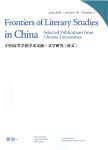Allegory, the Nation, and the March of Time: An Essay on Modern Chinese Literature in Honor of Fredric Jameson
Allegory, the Nation, and the March of Time: An Essay on Modern Chinese Literature in Honor of Fredric Jameson作者机构:Department of East Asian Studies New York University New York NY 10003 USA
出 版 物:《Frontiers of Literary Studies in China-Selected Publications from Chinese Universities》 (中国高等学校学术文摘·文学研究(英文版))
年 卷 期:2013年第7卷第2期
页 面:305-318页
学科分类:0501[文学-中国语言文学] 0304[法学-民族学] 03[法学] 030401[法学-民族学] 05[文学] 050106[文学-中国现当代文学]
主 题:Fredric Jameson Yu Dafu Lao She Xiao Hong Zhao Shuli messianic utopian time
摘 要:In this essay I engage with Fredric Jameson's theoretical works and ideas, especially his concept of national allegory, and examine their possibilities and limits for use in literary analysis of Modem Chinese Literature. In particular, I examine the themes of the nation and the passage of time in the works of Yu Dafu, Lao She, Xiao Hong, and Zhao Shuli and argue for evidence of a historical development from cyclical narrative to messianic and utopian linear time in their novels. While Yu Dafu's "Sinking" (Chenlun) and Lao She's Camel Xiangzi (Luotuo Xiangzi) both display a desire to break free from cyclical time and narration, the narratives fold back into themselves. In contrast, Xiao Hong's The Field of Life and Death (Shengsi chang) mediates between two different temporal schemes and marks a transition to the linear developments prevalent in Socialist Realist novels such as Zhao Shuli's Sanliwan Village (Sanliwan). While Jameson's earlier works on Realism, Marxism, and the "Political Unconscious" all provide valuable insight into Modem Chinese Literature and the novels mentioned, Jameson's engagement with Chinese authors has also opened up new ways of examining Chinese literature.



